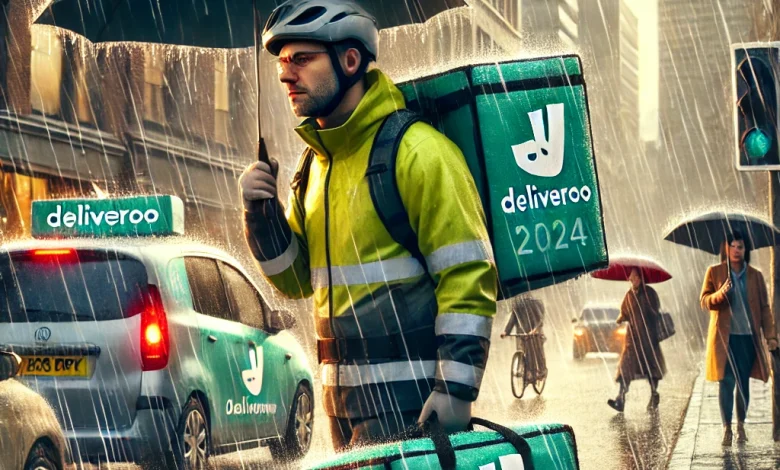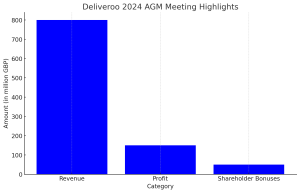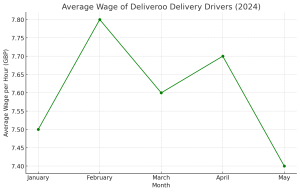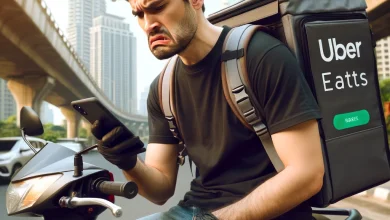The Struggles and Triumphs of a Gig Economy Delivery Driver

Introduction
The gig economy has become a significant part of the modern workforce, offering flexible work opportunities through platforms like Deliveroo, Just Eat, and Uber Eats. While these jobs provide a degree of flexibility, they come with their own set of challenges and struggles, especially for delivery drivers who often face financial instability and difficult working conditions.
Deliveroo’s 2024 AGM Highlights
The 2024 Annual General Meeting (AGM) of Deliveroo was a notable event, not just for its financial reports but also for the significant protests by delivery drivers. According to Deliveroo’s official reports, the company has shown a positive financial trajectory with substantial profits and generous bonuses for shareholders. Deliveroo’s executives highlighted an increase in revenue and a commitment to expanding market share.
Deliveroo 2024 AGM Meeting Highlights

Source: Deliveroo plc 2024 AGM Report
The company’s revenue reached £800 million, with a profit of £150 million. Shareholders received bonuses totalling £50 million.
Financial Disparities and Driver Struggles
Despite Deliveroo’s claims of meeting or exceeding the national living wage during active deliveries, many drivers report earning well below the minimum wage when considering the entire time they spend working. This discrepancy arises because drivers are paid per delivery rather than hourly, and they often spend significant unpaid time waiting for orders, dealing with traffic, or facing restaurant delays.
Average Wage of Deliveroo Delivery Drivers (2024)

Source: Bureau of Investigative Journalism Report on Deliveroo Wages
The line graph illustrates the average hourly wage of Deliveroo delivery drivers from January to May 2024. Despite the company’s claims of meeting the national living wage, the average wage remains below the expected rate, fluctuating around £7.4 to £7.8 per hour, highlighting the financial struggles faced by the drivers.
Protests and Strikes
In 2024, protests and strikes by delivery drivers became more frequent. Drivers expressed their frustrations at the AGM, describing their working conditions as “soul-destroying.” The core issues included poverty-level pay, lack of job security, and inadequate support from the company.
The AGM in May 2024 was marked by significant protests from delivery drivers, supported by groups like ShareAction and the Independent Workers Union of Great Britain (IWGB). Drivers demanded fairer pay structures, better working conditions, and recognition as employees rather than self-employed contractors. This status leaves them without benefits such as sick pay, holiday pay, and pension contributions.
Real Life Stories from Deliveroo Drivers
Shaf Hussain, a delivery rider and chair of couriers and logistics for IWGB, shared his experience, stating, “We are slaves to the platform. You might work 12 hours, make £100 or so. But you need to pay for petrol and if you get punctures, pay for repairs. It just goes down.” He highlighted the dangers of the job, noting that to earn minimum wage, he often had to run red lights and avoid stopping, making the work extremely dangerous[32†source].
Ulisses Caoffi, another delivery rider and strike organizer, explained that delivering for platforms like Deliveroo involved riding “huge distances” for very little pay, often between £2.80 and £3.15 per delivery. He emphasized that the current compensation structure does not cover the costs incurred by riders, such as petrol and insurance, leading to financial instability[32†source].
Marcio Silva, a part-time driver for Deliveroo, expressed his frustration, “Sacrificing a few hours for our rights is essential, instead of continuing to work incessantly for insufficient wages.” He and others have been at the forefront of organizing strikes to demand fair compensation and better working conditions[30†source].
Protests Video
This video provides a visual representation of the protests and the drivers’ demands for better working conditions and pay.
Hope for Change
The Labour Party’s manifesto for 2024 includes comprehensive plans to improve workers’ rights, especially for those in the gig economy. Some of the key proposals include:
- A Genuine Living Wage: Labour plans to ensure the minimum wage reflects the cost of living and remove discriminatory age bands so all adults benefit equally.
- Ban on Exploitative Zero-Hour Contracts: The party aims to end the uncertainty of zero-hour contracts, providing workers with more job security and predictability.
- Ending Fire and Rehire Practices: Labour intends to reform the law to prevent employers from dismissing and rehiring workers under poorer conditions.
- Basic Rights from Day One: These include rights to parental leave, sick pay, and protection from unfair dismissal from the first day of employment.
- Strengthening Trade Unions: Labour plans to update trade union legislation to ensure fair negotiation and cooperation between employers and employees[22†source][23†source][24†source].
Conclusion
The life of a delivery driver in the gig economy is fraught with challenges. While companies like Deliveroo report financial success and growth, the reality for many drivers is one of financial hardship and job insecurity. The protests and strikes of 2024 highlight the urgent need for systemic change to ensure that gig economy workers are treated fairly and can earn a decent living. With potential political support and growing public awareness, there is hope for a future where these workers are given the respect and compensation they deserve.
Sources:

